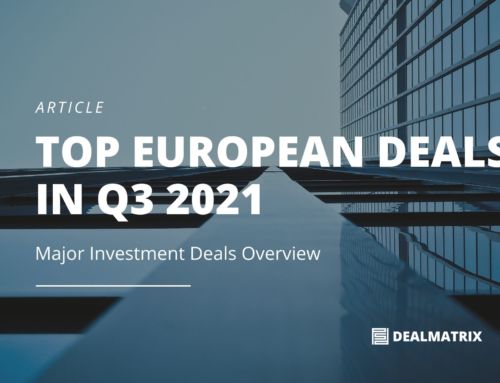How to make sense of Venture Capital Data?
With the modern world and technology developing so rapidly, access to information has never been easier to obtain.
Data is constantly collected and shared with the whole world to see – regardless of whether it’s a firm’s audit report or just a daily Facebook status. Similarly, data of venture capital firms is also available for every individual with access to the internet. However, even though finding the databases for different types of private equity firms is simple, one has to wonder how correct, complete, and timely this information is. Whilst historical data can often be obtained for free, more “up-to-date” information can only be accessed after paying a one-time or subscription fee. The data quality is questionable, as nearly all data providers crawl news feeds and rely on investors – who use the databases themselves – to correct these crawled datasets.
Past vs. present venture capital data in the public domain
In 2015, only a limited selection of databases and actively collected information were shared with the public, the main providers have been VentureXpert and Venture Source. Today, there is a large variety of venture capital databases that can be accessed by the public; as well as many data suppliers such as Crunchbase, Pitchbook, Owler, IVC Research Center, Preqin amongst the most well-known, though the list continues. The information these databases contain, shows investments from various venture capital and private equity firms in companies in all stages: starting with pre-seed and up to pre-IPO stages. However, the data that is collected through news might not represent the full (honest) picture.
Larger funds, with a longer track record and more deal flow, tend to have a clear advantage due to proprietary datasets – it is a “secret sauce” that most of these funds won’t share.
Partners at Venionaire Capital
Transaction terms have a strong impact on valuations and are not being published at all. Nevertheless, analysts may use past transaction data to benchmark their own investment decisions. Contrary to popular belief, venture capitalists do not only invest based on their intuition. They also reason their decisions based on past experiences and assessments using public and private data from numerous databases and sources. This process promotes a more data-driven approach to investing and filtering for the most promising candidates. Larger funds, with a longer track record and more deal flow, tend to have a clear advantage due to proprietary datasets – it is a “secret sauce” that most of these funds won’t share, as we have learned from an interview with Partners at Venionaire Capital, a leading venture- and private equity firm based in Vienna, Austria.
What are the major concerns that come with venture capital data availability?
With such increased data accessibility, several questions arise: is the data in these databases valid, complete, and trustworthy? Especially in the venture capital market, firms in which venture capitalists invest often grow rapidly, or implode within months. Hence, having up-to-date information available is crucial to investors. The largest obstacle by far is the fact that no database, regardless of whether it´s free or paid, is complete. This comes because of the simple fact that PE and VC are private markets, where participants are not legally obliged to report their activities. Therefore, any data source will undoubtedly suffer from various biases, including survivorship bias and cherry-picking. For the same reason, even the information that is published can rarely be verified.
Most database providers use Internet crawlers to gather data from thousands of different sources, however, the validity of this data is often questionable. Therefore, as long as there is no legal obligation for investors and investees to publicly report their transactions, the available databases can never be relied on completely.
Dealmatrix proprietory Deals Monitor is not an exemption, we must admit. Having said this, we apply some additional “magic”, with our algorithms – learning from statistical, anonymous sector data collected through our valuation calculator – to make more sense out of transaction data within a market and timeframe. We will offer market statistics (scheduled to launch soon) through Dealmatrix, which is hopefully more accurate than what you find elsewhere.
Even in cases where the source data is correct, issues can arise due to variation in methodologies used to display that data. This can be due to different formalities in various countries or regions, or it could also be due to a language barrier (International comparability of venture capital data). To prevent this problem, the investors who use these databases are encouraged to double-check and verify the data with proprietary data-sets and occasionally even re-do the calculations themselves.
Another major problem that comes with interpreting data of venture capital firms is the lack of causality. The databases only provide statistics showing the investments and the profits between various venture capitalist firms and the companies they invest in. This does not include the reasoning behind the investment. Therefore, the risk exists that the databases could provide distorted data leaving analysts to come to the wrong conclusions. It is difficult to check whether a bias exists, as a lot of false data is generated and published with the constant flow of information. In such situations, other factors such as the companies’ (both the data-provider company and the firm whose data is published) reputation and integrity serve as indicators of whether the data is to be trusted or not. In the past years, data published by firms has rarely been evaluated with the intention of decreasing room for fraudulent activities.
What does data transparency within venture capital firms mean for the market?
In 2018, the European Union (EU) set regulatory measurements called General Data Protection Regulation (GDPR), imposing strict guidelines on how firms should deal with data they collect from their consumers. The regulations have mostly been targeted at protecting consumers, while little attention has been given to the information that companies made public about themselves – especially regarding the investments they received. The only exception being professional audit reports for balance sheet verification. The EU has implemented statutory audit regulations in 2017 where companies are obliged to have their financial statements checked by authorities with the intention of having increased insight over the economic progress of firms. These audit reports can verify the outcomes of investments and can increase the understanding for venture capitalists.
Even though that is an improvement and a step closer towards higher transparency within the venture capital market, these audit reports cannot evaluate the causality of investments. In addition, such inspections are mostly done on a quarterly basis, sometimes even annually. Since investors often rely on the real-time availability of data after an investment has been made, the firms or providers of the data are able to feed misleading information in the short run. In the long run, audit reports should provide more insight into the companies, possibly jeopardizing the databases´ integrity. Still, that does not help an investor who may have already invested based on false data easily available in the public domain.
From a firm’s perspective, on one hand, it might not always be in their best interest to share every step of their development with the world, as it can give competitor venture capitalists insight into their progress. On the other hand, such transparency may act as a way of proving their integrity and candidness to the outside world, this being even more enforced through the audit reports. Hence, it varies depending on a venture capital firm’s intention. For the market itself, transparency is vital. For investors and government, it’s of great importance to increase transparency as much as possible as it allows a ‘fair game’ to be played. Especially during the ongoing COVID-19 pandemic, the number of online scams has increased drastically. Therefore, it is not surprising that a market that has received increased investment is Regulatory Technology- otherwise known as RegTech. With the improved technology allowing data control and verification offered by RegTech, more firms or individuals could consider investing in such RegTech companies, allowing this market to further expand and improve.
In general, transparency and access to reliable data lead to increased investments and thus to a greater variety of firms who will be able to grow leading to new markets to expand – a process that is of vital importance for venture capital firms.
Credits to: Samuel Wallner, student at Birkbeck University of London
Dealmatrix startup valuation engine helps you to calculate a valuation regardless if your company is pre- or post-revenue. Prepare for your upcoming negotiations by having the first valuation overview in hand.

![Startup Growth Pains: How To Handle Them? [Tips For Startup Founders]](https://dealmatrix.com/wp-content/uploads/2021/11/DM_Blog_Images-13-500x383.png)



